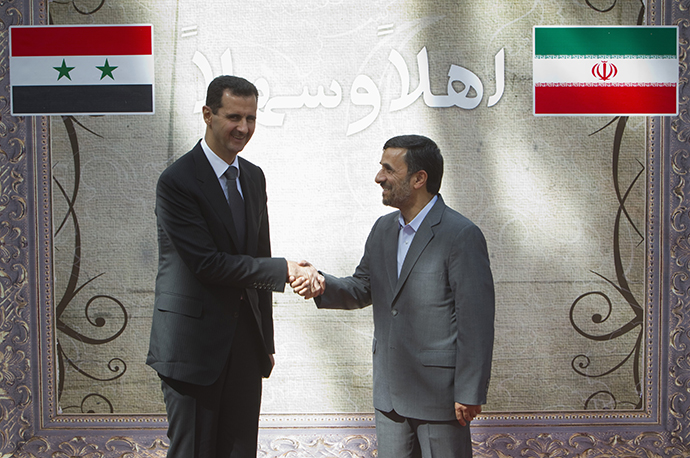‘Syrian conflict is a war targeting Iran’
The rise of sectarian violence and recent Israeli bombing indicate that the true aim of the Syrian civil war is to weaken Iran’s position in the region, Middle East expert Tariq Ali said in an interview with RT.
Hezbollah militants are fighting beside Syrian governmental
troops to retake the strategic town of Qusair from the rebels. It's
considered a key weapons smuggling route for opposition forces near
the Lebanese border.
The battle for the city in the contested Homs Province is viewed by
both sides as a turning point which could prove crucial in deciding
the conflict.
Tariq Ali believes Hezbollah has joined the fight in order to
protect the weapons smuggling routes of their own, those coming
from neighboring Iran.
As for the Syrian people, Ali says the majority just wants the war
in the country to end, no matter which side gets the upper hand.
RT: Shia Hezbollah have joined the fight against the
mostly Sunni rebels. Is this conflict becoming sectarian?
Tariq Ali: I think, effectively, what this war is now
increasingly becoming is a war that’s targeting Iran and trying to
remove Iran’s only Arab ally. It’s become very clear in the way
which sectarianism has been used. Sunni versus Shia, Shia versus
Sunni. I mean, without assigning blame or responsibility, that is
what’s going on, effectively now, both in Iraq and in Syria. In
Iraq you had a situation where the Sunnis constituted a minority,
but ran the previous regime – the US intervened and effectively
handed over power to the Shia religious parties of one sort or
another. They then carried out large ethnic cleansings in Baghdad
and in other cities, and we now see the response to that at a time
when the US itself has very few – if any – troops left in Iraq.

In Syria you had the opposite. You had a large Sunni majority, which was govern by an Alawite regime, very closely linked to Iran. And the Arab uprising that took place destabilized further. In my opinion, you have minorities supporting the Syrian government, minorities supporting the Islamist rebels and a large proportion of the population waiting for the war to end and hoping that something would happen to bring conclusion to this war.
RT: Could Israel now attack Syria under the guise of defending itself, since its old enemy Hezbollah are there?
TA: You know one reason Hezbollah is being actively defending the government forces in Syria is because they fear that their link to Iran will be broken and their long to getting weapons to defend themselves will be broken. The Israelis have already bombed Syria meeting with very little opposition – hardly any – from the so-called international community, which is the US and the EU. In fact the Israelis bombed Syria without getting some sort of green light from the US. Were they to do so again – it would create an even larger mess.
The Israelis haven’t been threatened by Syria for a very long time. In fact, the Syrian government of President [Bashar] Assad and his father [former President Hafez Assad] had de facto collaborated with the Israelis in the past. So where they see the threat isn’t Syria, but Iran that’s the Israeli obsession. And in order to weaken Iran further they might carry out attacks on Damascus, but then they should be prepared for some consequences.
RT: Strategic affairs analyst Salam Harba says militants are using the people in the city Qusayr as human shields. Could we see the Syrian government blamed for the civilian deaths?
TA: Well, it could be. The situation is so confused. We still don’t know about the chemical weapons. The single United Nations’ reports blamed the rebels. The rebels blamed the Syrian government. The Syrian government says ‘Why should we even bother to use them when we’ve got MIG-29s in the air which can do more damage?’
Effectively, in my opinion, both sides are committing atrocities. There’s no doubt about it. In a civil war this is inevitable. It happens. So the fact that we’ve recently seen of Syrian or Islamist radicals eating the organs out of the body of a Syrian soldier is, of course, horrendous. And I think it’s done the rebels a great deal of harm. I think they are getting isolated from the Syrian people. I don’t think there’s any doubt about that. People are desperate. They have no idea what’s going to happen, when this war comes to an end.
The statements, views and opinions expressed in this column are solely those of the author and do not necessarily represent those of RT.












